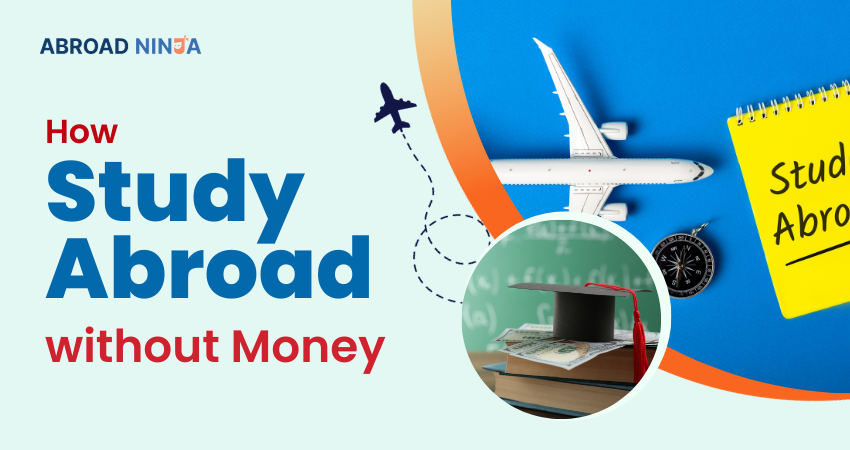Studying abroad is a popular dream of many, but finances can be a big barrier. However, there are ways to make it happen without breaking the bank. Being proactive and resourceful can help you find ways to study abroad without money.
Here are some strategies to consider:
- Apply for scholarships and grants specifically for international students. Many universities and organizations have financial assistance programs that cover tuition fees, accommodation, and living expenses. These scholarships are merit- or need-based, so research and apply for as many as possible.
- Explore government-funded exchange programs. Germany, Norway, and Finland offer tuition-free education for both locals and internationals. These programs let you immerse yourself in a new culture while studying for free.
- Check if universities provide work-study programs. Students can work part-time while studying abroad, helping to cover living expenses and gaining valuable work experience. Jobs such as tutoring, freelancing, or working in campus facilities can help reduce expenses.
- Networking is a key factor too. Reach out to alumni or professionals who have studied or worked overseas. They can provide advice on scholarship opportunities and managing finances during your time abroad.
Study Abroad without money!
Researching scholarships and grants
Scholarship and grant research is important when studying abroad. It helps students find financial aid without spending their own money. Here are 3 key points to remember:
- Identify Eligibility: Check what criteria you need to meet for scholarships and grants. This might include your academic performance, extracurricular activities or specific areas of study.
- Utilize Online Resources: Search online for websites and databases that provide info on available scholarships and grants. This will help narrow down options that match your qualifications and goals.
- Application Preparation: After identifying potential scholarships or grants, prepare strong applications. Customize each application to the funding organization’s requirements and expectations.
Keep researching for scholarships and grants. New opportunities may come up during your study abroad journey. Plus, a study by the Institute of International Education found that over 70% of U.S. students who study abroad rely on some form of financial aid or scholarship.
Finding universities with affordable tuition fees
When looking for universities with affordable tuition fees, it is important to consider financial accessibility. Here are three key points to keep in mind:
- Explore scholarship opportunities: Look for universities that offer scholarships or financial aid programs specifically for international students. This can greatly reduce the cost of tuition fees and make studying abroad more affordable.
- Research tuition fee structures: Some universities have different fee structures for different programs or departments. By researching and comparing these structures, you may find options that are more budget-friendly while still meeting your educational goals.
- Consider student exchange programs: Many universities have partnerships with institutions around the world, allowing students to participate in exchange programs. These programs often offer reduced tuition fees or even tuition waivers, making them a cost-effective option for studying abroad.
Additionally, it is important to note that each university may have its own unique details and requirements in terms of financial support. It is recommended to thoroughly research and contact the universities directly for accurate and up-to-date information.
Pro Tip: Start your financial planning early and explore multiple funding options, including grants, sponsorships, and part-time jobs. This will help ensure a smoother journey towards studying abroad without financial constraints. Know More – Abroad Ninja
If you’re lucky enough to find a scholarship, you won’t just be exploring new opportunities, you’ll be exploring new countries on someone else’s expense account.
Exploring scholarship opportunities offered by universities
A useful table for students who need financial help showcases the various scholarships universities offer. It includes columns such as: university name, scholarship name, eligibility criteria, and application deadline. For example:
| University Name | Scholarship Name | Eligibility Criteria | Application Deadline |
|---|---|---|---|
| ABC University | Merit Scholar | GPA above 3.5 | May 31, 2022 |
| XYZ University | Need-based Grant | Family income below $50,000 per year | April 15, 2022 |
This info is helpful in assisting students to make informed decisions about their education. They can prioritize universities with scholarships that meet their achievements or financial state.
Also, some scholarships may have extra requirements like community service or specific fields of study. It’s important to research each opportunity and make sure they fit all the qualifications before applying.
Pro Tip: To explore scholarship opportunities, it’s best to start early and note any deadlines. Planning ahead gives students time to collect the documents they need and submit their applications quickly.
Other way: Study Abroad without money!
Applying for financial aid and student loans
Applying for Financial Aid and Student Loans
To secure funding for studying abroad, students can explore financial aid and student loan options. Here are five key points to consider:
- Research scholarships: Look for scholarships specifically designed for international students or study abroad programs. Many organizations, universities, and governments offer funding opportunities.
- Explore grants and fellowships: Grants and fellowships provide financial assistance without the requirement of repayment. These can be obtained from various sources, including government bodies, foundations, and private organizations.
- Check with your home institution: Some universities have their own study abroad scholarships or financial aid programs. Contact your home institution’s financial aid office to inquire about any available options.
- Research student loans: Look into student loan programs that cater to students studying abroad. Be sure to compare interest rates, repayment terms, and eligibility criteria.
- Consider part-time work opportunities: While studying abroad, students can explore part-time job options to support their financial needs. Check local regulations regarding work permits and restrictions for international students.
In addition, it is important to seek guidance from financial aid advisors and research online platforms that provide resources on studying abroad without money.
True Fact: According to the Institute of International Education, the number of U.S. students studying abroad has increased by 1.3% to reach a total of 347,099 students in recent years.
Who needs a government handout when you can just become a master of disguise, infiltrate their ranks, and secure your own study abroad funding?
Also Read: Top 10 Reasons Why you should study Abroad
Researching and applying for government-funded programs
- Research government websites to find out about different programs, criteria, and deadlines.
- Attend informational sessions or webinars offered by gov agencies to learn more about the requirements and benefits of the various funding programs.
- Speak to school advisors and financial aid officers for advice on how to apply.
- Look online for forums and social media groups to get students’ experiences and advice on applying for government funding.
- Keep up to date with policy changes in these programs – they may affect eligibility or funds available.
- By researching and understanding these programs, people can make informed decisions about which avenues to take for financial support.
- Sarah was determined to make it work when she found out about a lesser-known grant program offered by her state government. She consulted her school advisor and got all the documents ready before the deadline. Months later, her application was approved – allowing her to attend college without worrying about debt. Sarah’s research and application for this government-funded program paid off hugely!
Exploring private organizations and foundations for scholarships
Private orgs and foundations provide loads of chances for students looking for scholarships. These institutions lend financial aid to students on criteria such as academic success, extracurricular activities, and community involvement.
Check out some popular private orgs and foundations that provide scholarships:
| Organization/ Foundation | Eligibility Criteria | Scholarship Amount |
|---|---|---|
| XYZ Foundation | Minimum GPA 3.5 | $5,000 – $10,000 |
| ABC Corporation | Major in engineering | $2,000 – $8,000 |
| 123 Trust | LGBTQIA+ students | $1,500 – $5,000 |
Before you apply, it’s important to study each organization and its requirements. Private orgs often have special eligibility criteria applicants must meet. Some might ask for essays or interviews as part of the application.
One great chance is the XYZ Foundation Scholarship. They prioritize applicants who show remarkable leadership skills and involvement in community service. This scholarship offers a generous amount from $5,000 to $10,000.
Let me tell you Sam’s story. Sam wanted to study higher education but didn’t have enough money. Sam researched and found the ABC Corporation scholarship which specifically backed engineering majors. Sam applied and was given a scholarship worth $4,500 every year. This helped Sam concentrate on learning without stressing about tuition fees.
Exploring private organizations and foundations for scholarships can give students who need money many opportunities. It’s critical to explore all possible ways to fund your education and take advantage of the generosity these institutions offer.
Understanding the process of student loan applications
Student loan applications can be intimidating, but understanding the process is key. Here’s a guide to help you out.
- Research: Start looking into all available student loan options – federal loans, private loans, and scholarships. Figure out their requirements.
- Documents: Get all necessary documents ready. These could include Social Security number, tax returns, bank statements, and proof of enrollment.
- Forms: Fill out the application forms accurately and truthfully. Double-check for any mistakes. Wrong info can lead to rejection or delay.
- Submit & follow up: Send in the forms then keep track of progress. Follow up with the financial aid office or lender to make sure all docs have been received.
Note that each loan option may have its own deadlines and specific requirements. Get familiar with these details for a successful application.
To get the best results, stay active throughout the process. Meet deadlines, provide all necessary docs on time, and follow up.
You’re competing with thousands of students for financial aid. Explore all possible avenues for funding your education! Take action now!
Also Read: 7 Best Study Abroad Programs in 2023
Working part-time or applying for work-study programs
Semantically optimized advice for financing a study abroad experience:
Working part-time or participating in work-study programs can be crucial for funding your study abroad adventure. Here are some important points to consider:
- Earn money through part-time jobs: Look for opportunities to work while studying, such as on-campus jobs or local employment. Prioritize positions that offer flexible working hours to accommodate your academic schedule.
- Apply for work-study programs: These programs provide financial assistance through part-time employment on campus. It’s a win-win situation as you earn money and gain valuable work experience, all while pursuing your academic goals.
- Consider internships or apprenticeships: Look for paid internships or apprenticeships relevant to your field of study. These opportunities not only provide financial support but also enhance your resume.
- Explore remote work options: With the rise of digital platforms, remote work has become more accessible. Look for freelance or remote job opportunities that can be done online, allowing you to work while abroad.
- Utilize your skills: Identify any marketable skills you possess and seek freelance or consulting gigs. Whether it’s graphic design, photography, writing, or tutoring, leveraging your talents can help generate income.
- Research scholarships and grants: Look for study abroad scholarships and grants, both from your home country and the host institution. These funding options can significantly reduce the financial burden.
Furthermore, you may explore alternative funding sources specific to your destination, such as government programs, cultural exchange programs, or crowdfunding. Remember, every little effort counts when it comes to financing a study abroad experience. Don’t miss out on the opportunity to broaden your horizons and immerse yourself in different cultures. Start exploring your options today!
Finding a job abroad is like searching for a unicorn, but hey, at least you’ll have a great story to tell back home when you’re living under a bridge!
Researching job opportunities in the host country
To research local job opportunities, you can:
- Research local job boards and country-specific websites.
- Peruse social media sites like LinkedIn and Facebook groups for job seekers.
- Reach out to recruitment agencies for advice.
- Attend career fairs, conferences, and networking events.
- Ask students or alumni for insights.
- Contact chambers of commerce or trade orgs for expats.
When applying, be mindful of cultural customs and expectations. Developing language skills can be a valuable asset to employers.
Understanding work-study programs and their benefits
Work-study programs are a great way for students to gain experience and learn at the same time. There are lots of advantages that these programs offer, such as:
- Financial Help: Students have the chance to make money for their tuition.
- Flexible Hours: They can pick their working hours to fit around classes.
- Work Experience: Gaining useful skills in their field of study.
- Networking: Interacting with teachers, staff, and professionals in the same field of work.
- Time Management: Developing strong organizational skills.
- Better Resume: Having relevant work experience to show off.
Also, work-study programs make it easier for students to feel connected to the school. This connection can benefit their overall college experience.
For instance, Sarah was able to benefit from a work-study program. She worked in the admissions office while studying business administration. This was a great way to gain practical skills in communication, organization, and attention to detail. After graduating, Sarah already had amazing work experience, which helped her find a full-time job at a great company right away.
Also Read: How to Go Abroad For Studies After 12?
Saving money before and during your study abroad experience
Saving money before and during your study abroad experience can be achieved by following a few strategies. Firstly, consider applying for scholarships, grants, or financial aid to lessen the financial burden. Secondly, create a budget and track your expenses to ensure you are spending within your means. Lastly, explore part-time job opportunities or freelance work to earn extra income while studying. Additionally, taking advantage of student discounts and opting for affordable accommodation options can also help cut costs. Remember to plan and research in advance to make the most of available resources and opportunities for financial savings without compromising your study abroad experience.
Creating a budget and saving plan: because who needs actual money to study abroad when you can survive on a dream, an empty bank account, and the sheer willpower to beg for free food?
Creating a budget and saving plan
Make a list of all expenses for your study abroad journey. This includes costs like:
- Tuition fees
- Accommodation
- Transportation
- Meals
- Entertainment
- Personal expenses
Set goals for each expense category. Track your income from scholarships, grants, jobs, or parental support. Create a budget plan with projected income and expenses. Look for areas to cut spending. Save regularly and stick to your budget. Proper planning and discipline are key for studying abroad.
Tip: Research cheaper options for accommodation, transportation, and meals to save money.
Implementing cost-saving strategies while abroad
Study abroad can be an invigorating experience! To make the most of it, implement cost-saving strategies. Being smart with finances means you’ll have enough money to explore and enjoy the culture – no need to break the bank! Follow this 4-step guide:
- Research & plan your budget. Consider accommodation, transport, food, entertainment and more. Look for affordable options and allocate funds.
- Take advantage of student discounts. Many countries offer them, so carry your student ID with you and inquire about them wherever you go.
- Cook your own meals. Eating out can be expensive. Cooking is cheaper and lets you explore local markets, try new recipes and bond with other students.
- Use public transport or walk. Taxis and ride-sharing services can cost you. Get to know the local public transport system and invest in a travel card if available.
Stay mindful of unplanned expenses. Emergencies happen – set some extra funds aside in case.
These tips will help you save money so you can get the most out of your study abroad experience. Plus, you’ll gain valuable budgeting skills. Start planning and saving today, and have a memorable journey of learning and adventure!
Exploring alternative funding options
Exploring Alternative Methods to Fund Your Study Abroad Journey
In order to finance your study abroad experience without worrying about money, you can consider various alternative funding options. Here are some practical ideas to help you explore and secure financial support:
- Scholarships: Look for scholarships specifically designed for students seeking to study abroad. These can be offered by universities, organizations, or even the government. Research and apply for scholarships that align with your academic achievements, interests, and goals.
- Grants: Similar to scholarships, grants can provide financial aid to students planning to study abroad. Grants are often awarded on the basis of financial need, academic performance, or specific study abroad programs. Check with your school’s financial aid office or look for international education grants offered by private institutions.
- Crowdfunding: Utilize online crowdfunding platforms to reach out to your social network for financial support. Create a compelling campaign that highlights the educational and cultural benefits of your study abroad experience. Be sure to offer unique experiences or rewards in return for donations, such as personalized postcards or a presentation upon your return.
- Part-time work: Consider finding a part-time job to fund your study abroad journey. Look for opportunities on or off campus that offer flexible hours and fit well with your academic schedule. Prioritize jobs that provide relevant skills or experiences that can enhance your resume.
- Internships and fellowships: Explore internships and fellowships abroad that offer financial support or stipends. These opportunities can not only help cover your expenses but also provide valuable work experience in your field of interest.
- Host institution resources: Research if the host institution or study abroad program provides any financial support or resources. Some universities offer grants, scholarships, or work-study opportunities for international students. Reach out to the study abroad office at your host institution to inquire about available assistance.
These funding options can greatly assist in making your study abroad dreams a reality. By exploring scholarships, grants, crowdfunding, part-time work, internships, and host institution resources, you can discover financial support while gaining a transformative international experience. Who needs a trust fund when you have a crowdfunding campaign? Watch your wallet magically refill as friends, family, and even strangers donate to your jet-setting dreams.
Crowdfunding campaigns
Crowdfunding campaigns are super unique! They provide worldwide access to those excited to back new ideas. Tailoring the campaigns to different targets makes it easier to get the right people. Offering rewards or incentives creates exclusivity and builds hype. Successful campaigns usually get media coverage, which boosts the project’s visibility and credibility. Plus, many platforms offer extra resources like mentorships or access to industry experts.
What sets crowdfunding apart is that it uses social networks to tell a story and build a personal connection with backers. Also, the transparency and accountability of these campaigns builds trust.
Forbes magazine says that Kickstarter, a top crowdfunding platform, has facilitated over $5 billion in creative project funding since launch.
Sponsorship from family, friends, or local organizations
This type of sponsorship offers advantages not seen in other funding options. Relationships help with trust and communication essential for success. Here are tips for seeking sponsorship from family, friends, or local organizations:
- State your vision clearly: Show passion and potential impact of your project/business to sponsors.
- Demonstrate credibility and be transparent: Prove you can handle finances responsibly. Share your experience, qualifications, or successes.
- Communicate the advantages to sponsors: Explain how it can help their image, create networking opportunities, or align with values.
- Give creative incentives: Offer exclusive access, discounts, or decision-making involvement.
- Stay connected and update them: Keep sponsors engaged with progress updates. This will make them feel involved and support ongoing efforts.
By following these suggestions, you can increase the chance of getting financial help while making stronger relationships.
Also Read: Top 10 Reasons Why you should study Abroad
Conclusion
We’ve come to the end of this article – “Study abroad without money: Insider tips & strategies”, and we can see studying abroad without money is possible! We’ve looked at the tips and strategies to do it. Scholarships, grants, part-time work – these are all options.
Everyone’s path is unique. Sarah‘s a great example. She got a full scholarship for postgrad in Europe. She had resourcefulness and perseverance and achieved her dream of studying abroad without money.
Frequently Asked Questions
FAQs for How to Study Abroad Without Money:
1. Is it possible to study abroad without any financial means?
A. Yes, it is possible to study abroad without money through various scholarships, grants, and work-study programs specifically designed for international students.
2. How can I find scholarships and grants for studying abroad?
A. You can find scholarships and grants for studying abroad by researching through online databases, contacting your university’s study abroad office, and exploring organizations that offer financial assistance to international students.
3. What are work-study programs, and how can I benefit from them?
A. Work-study programs allow students to work part-time while studying, which helps cover their living expenses and tuition fees. You can benefit from work-study programs by searching for opportunities at your chosen university or exploring government-funded initiatives.
4. Are there any specific countries or universities that offer free education to international students?
A. Yes, certain countries such as Germany, Norway, and Finland offer free or low-cost education to international students. Additionally, some universities worldwide provide tuition waivers or scholarships specifically for foreign students.
5. How can I budget my expenses while studying abroad?
A. You can budget your expenses by planning in advance, selecting affordable accommodation options, cooking your meals, using public transportation, and taking advantage of student discounts. It is important to be mindful of your spending habits and prioritize your necessities.
6. Can I work part-time while studying abroad to support myself financially?
A. Yes, many countries allow international students to work part-time while studying. However, there may be certain restrictions and limits on the number of hours you can work. It is essential to check the specific regulations of your host country before seeking employment.




